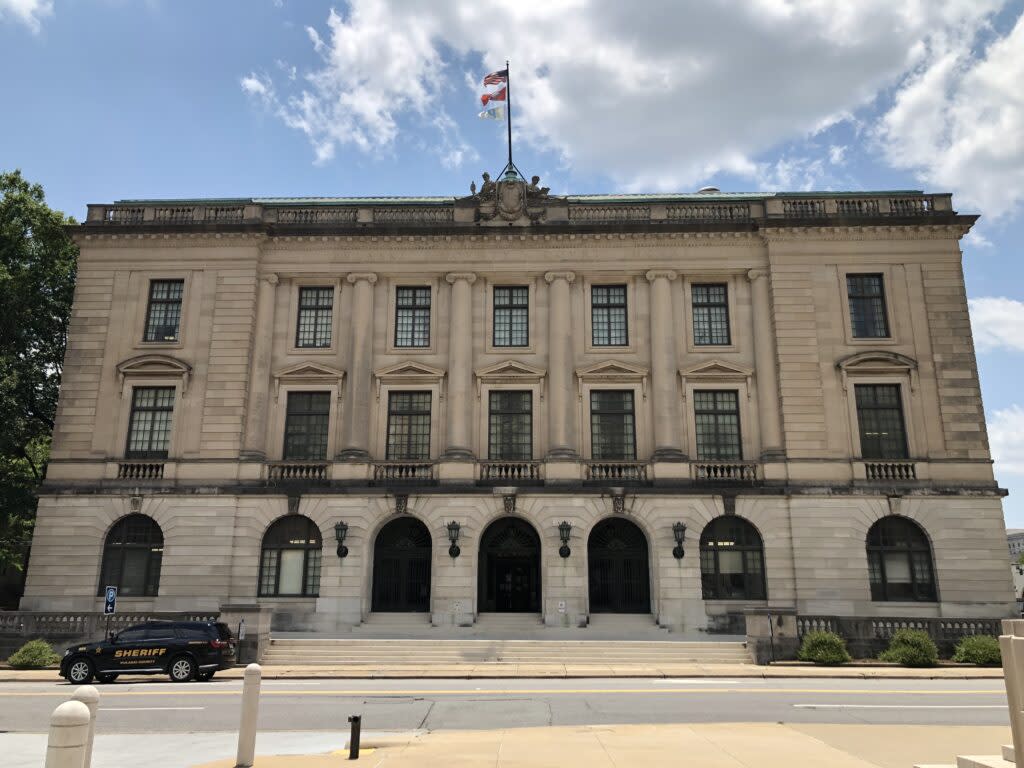Arkansas ballot groups await ruling on validity of new signature threshold

The Pulaski County Courthouse. (Antoinette Grajeda/Arkansas Advocate)
A judge plans to decide in the coming weeks if Arkansas ballot initiative groups must gather signatures from 50 or 15 counties to qualify for November’s statewide vote — a decision that could determine which proposals make it to Election Day.
In a brief hearing Monday morning, an attorney for several initiative groups and state lawyers debated the lawsuit challenging a new Arkansas law that makes it harder for citizen-led petitions to qualify for the ballot.
Pulaski County Circuit Judge Herb Wright said he hoped to rule by March 8 whether to block the enforcement of Act 236 of 2023, but he acknowledged that procedural rules may require additional time.
Wright also noted that the ultimate say in the case rests with the Arkansas Supreme Court, which will hear the almost-certain appeal.
“I understand, regardless of my decision, someone else is going to weigh in,” he said from the bench Monday.
GET THE MORNING HEADLINES DELIVERED TO YOUR INBOX
That decision will be eagerly awaited by a number of ballot groups collecting signatures on issues ranging from the state tampon tax to medical marijuana, abortion and government transparency. Those groups must submit their signatures to Secretary of State John Thurston by July 5 to qualify for the Nov. 5 election.
The lawsuit — brought by the League of Women Voters of Arkansas and Republican state Sen. Bryan King — seeks to have Act 236 struck down as unconstitutional.
The Arkansas General Assembly and Gov. Sarah Huckabee Sanders enacted the law during last year’s regular session in the Legislature’s most recent attempt to make it more difficult to qualify a proposed constitutional amendment, initiated act or referendum for the ballot.
Act 236 does this in two ways:
First, it requires canvassers to gather signatures from half the number of registered voters who voted in the most recent gubernatorial election in at least 50 counties. That’s an increase from the at-least 15-county requirement in Article 5 of the Arkansas Constitution.
Second, it removed the so-called “cure” period, which allowed ballot efforts that got close but fell short of the required number of signatures additional time to collect more petitions.
The lawmakers behind the new requirements said they were intended to ensure rural Arkansas had a voice in the process and to protect the Constitution from out-of-state interests.
King and the League of Women Voters, though, argue Act 236 places additional restrictions on the initiative process, directly contradicting Article 5 of the state Constitution.
The legislative power of the people of this State shall be vested in a General Assembly, which shall consist of the Senate and House of Representatives, but the people reserve to themselves the power to propose legislative measures, laws and amendments to the Constitution, and to enact or reject the same at the polls independent of the General Assembly; and also reserve the power, at their own option to approve or reject at the polls any entire act or any item of an appropriation bill.
– Article 5 § 1 of the Arkansas Constitution
“At least 15 is not the same as at least 50,” David Couch, the attorney for King and the League said Monday in court. “The statute is in obvious conflict,” and the Legislature doesn’t have the authority to amend the Constitution.
The Arkansas attorney general’s office asked Wright to dismiss the case, arguing that Article 5’s 15-county provision represented a floor but not a limit. The new law’s 50-county requirement doesn’t violate the Constitution because it is “at least 15,” according to the AG’s pleadings.
King and the League, also, weren’t working on any initiative efforts when the lawsuit was brought, therefore, they lack legal standing to bring the lawsuit, Assistant Attorney General Justin Brascher argued.
Additionally, Brascher said the suit should be barred by sovereign immunity.
Wright plans to rule on the state’s motion to dismiss first before moving on to the plaintiffs’ request for a preliminary injunction.
The AG’s office will have time — typically 10 days under procedural rules — to respond directly to the plaintiffs’ arguments if the motion to dismiss is rejected.
The post Arkansas ballot groups await ruling on validity of new signature threshold appeared first on Arkansas Advocate.

